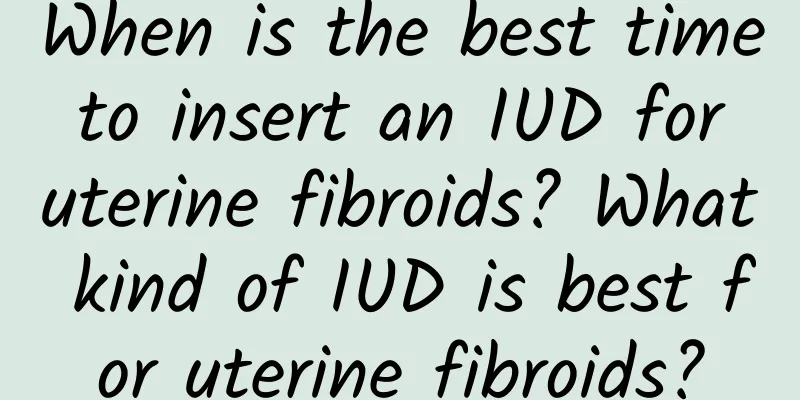What causes uterine fibroids? What are the symptoms of uterine fibroids?

|
What causes uterine fibroids? What are the symptoms of uterine fibroids? Uterine fibroids are common benign tumors in women, which originate from the smooth muscle cells of the myometrium. Like other tumors, uterine fibroids also have their specific causes and symptoms. 1. Causes of uterine fibroids: 1. Abnormal estrogen levels: Estrogen is an important hormone in women's bodies and plays a vital role in the growth and differentiation of uterine muscle cells. In some cases, the level of estrogen will increase abnormally, such as long-term use of contraceptives containing estrogen, female hormone replacement therapy, obesity, etc., which may lead to the occurrence of uterine fibroids. 2. Genetic factors: Genetic factors also play an important role in the occurrence of uterine fibroids. If a person's mother or sister has had uterine fibroids, then she herself is more likely to suffer from uterine fibroids. 3. Other factors: In addition to the above two points, some other factors may also lead to the occurrence of uterine fibroids, such as obesity, eating high-fat and low-fiber foods, lack of exercise, etc. 2. Symptoms of uterine fibroids: 1. Irregular menstruation: Uterine fibroids often cause irregular menstruation and increased menstrual flow. Some patients may experience symptoms such as shortened menstrual cycles, prolonged menstruation, or intermittent bleeding. 2. Abdominal discomfort: As the fibroids grow, patients may feel abdominal pain, bloating and other discomfort. Sometimes, fibroids can also compress surrounding organs, leading to symptoms such as frequent urination and constipation. 3. Infertility issues: In some cases, uterine fibroids may affect fertility. When fibroids are located in the uterine cavity, it will cause difficulties in embryo implantation, while fibroids located in the myometrium may affect the formation and development of the placenta. 4. Pelvic compression symptoms: When the fibroids grow larger and compress the surrounding organs, the patient may also experience pelvic compression symptoms such as frequent urination, urgency, constipation, abdominal distension, etc. 5. Other symptoms: Sometimes, uterine fibroids may also cause other symptoms, such as back pain, lower limb edema, pain during sexual intercourse, etc. The cause of uterine fibroids may be related to abnormal estrogen levels, genetic factors, and other factors. Symptoms generally include irregular menstruation, abdominal discomfort, infertility problems, pelvic compression symptoms, and other symptoms. Women who experience related symptoms should seek medical attention for diagnosis and treatment in a timely manner to avoid further deterioration of the patient's condition. |
<<: What causes uterine fibroids? What causes uterine fibroids?
>>: What to do for hysterectomy and how much does it cost to do hysterectomy?
Recommend
What medicine can help women with functional uterine bleeding get better faster?
In terms of drug treatment for functional uterine...
Experts explain the common causes of vulvar leukoplakia
Vulvar leukoplakia is a gynecological disease tha...
What medicine is good for women with irregular menstruation? These Chinese medicine prescriptions can cure irregular menstruation
What medicine is good for irregular menstruation?...
Abnormal leucorrhea, white, sticky foreign matter
Abnormal vaginal discharge is white and sticky, w...
Eating mooncakes and barbecue during the Mid-Autumn Festival may cause gastroesophageal reflux and indigestion! Traditional Chinese Medicine: Lotus Leaf, Hawthorn and Tangerine Peel Tea Aids Digestion
Eating mooncakes, delicious food, and plenty of m...
Prevention of cervical hypertrophy should actively control the primary pathogens
Women should change their underwear frequently, a...
Sitting still for a long time will lead to obesity in the lower body! Get rid of these three NG foods and eat to get beautiful legs
Lack of exercise or sitting still for long period...
There are some tips to prevent threatened abortion
Many female friends will encounter many problems,...
Focus on the diagnosis and treatment of vulvar leukoplakia in the middle-aged and elderly
Do you know what the symptoms of vulvar leukoplak...
Briefly explain the methods of nursing patients with ectopic pregnancy
The occurrence of ectopic pregnancy will affect w...
Drink unsweetened soy milk 30 minutes before meals to increase satiety
With the arrival of the long summer vacation, chi...
How long can you last in the marathon of life? Genes only determine 20% of our destiny! Do these things to keep you healthy and aging
Exercise and diet control: Everyone wants it, but...
Is fat the culprit of obesity? A low-fat diet won’t make you lose weight! Study: Carbohydrates are the key
Losing weight requires controlling your diet, and...
Four types of food that women should eat during menstruation
In life, many women have menstrual period, and dy...
What impact will the complications of cervical erosion have on patients?
Many women with cervical erosion are most worried...









